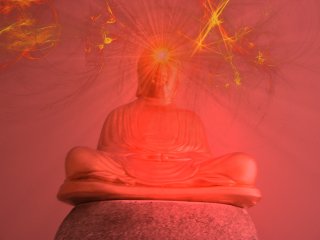The Narendra Modi government has amended Gujarat's Freedom of Religion Act, which made forced religious conversions illegal in 2003.The bill seems to be primarily aimed at dissuading Hindus (especially poor Dalits) from converting to "foreign" religions, mainly Christianity, but is also targeted at Buddhism. Ever since Dr. B. R. Ambedkar took refuge in the Buddha, the Dharma, and the Sangha in 1956, Buddhism has been a popular choice of identity for low-caste Hindus, such as Dalits, seeking to assert their independence from Hinduism and its caste system. In fact, when Dr. Ambedkar converted to Buddhism, he specifically took 22 vows many of which repudiate the beliefs of Hinduism.
The bill, a copy of which is with NDTV, now says there's nothing illegal about converting from one denomination to another within a religion. It also claims that Buddhism and Jainism are part of Hinduism.
The purpose of the amendment seems to be to ensure that the number of people counted as "Hindus" for governmental purposes do not drop even if some of them convert to Buddhism. Naturally, many Buddhists are not pleased with being co-opted for political purposes.
To my knowledge, there have been no actual documented incidents of forced conversion, which is what the bill claims to be against. Many Christian organizations, however, provide access to education and health care, which some critics feel is a way of bribing the recipients of these services into conversion. But if Hindu leaders feel that Christians are luring away their followers with schools and hospitals, the proper response is not to outlaw conversions, but to compete against them by building better schools and hospitals. But alas, the politicians have chosen to take the easier path.
The conclusions that one may draw from the bill along with its amendment are also rather odd. Forced religious conversions are illegal -- except within a religion, and Buddhism is a part of Hinduism. This seems to mean that Buddhists are now legally entitled to convert (other) Hindus to Buddhism by force! (I'm not suggesting that any Buddhist would or should do this, I'm just pointing out the silliness of outlawing forced conversions while allowing for exceptions.)
Since 1992, the BJP has been actively wooing the Dalits, who in many areas now make up their new vote bank.("Bouddh" is the Hindi word for "Buddhist".)
And this amendment ensures that Dalits will now be placated. If, for instance, they convert to Buddhism and thousands have done so over the years, they will now not be breaking the law.
[...]
The Buddhists of course aren't pleased with the government's cavalier attitude.
"The Hindu religion centres around Gods and Goddesses and the human beings are not given an important position. In Buddhism the religion centres around the human being," said Ramesh Banker, Bouddh citizen.
Constitutional experts say that it’s debatable whether Jainism is part of Hinduism or not. But there's no way Buddhism can be clubbed with Hinduism. They suspect a political agenda behind the move.According to "the letter of the law" in Gujarat, a Japanese Zen monk, for example, would be classified as a Hindu. This is of course very silly.
"The basic purpose of the bill is to prohibit conversion, but the amendment results in Buddhism being converted into Hinduism. This is not right," said Girish Patel, activist and lawyer.Unfortunately, all sorts of bad things have a tendency to happen whenever religion is mixed together with politics. This has been true throughout the world and throughout history. One would think that humans would have learned better by now.
The opposition of course is only too happy to expound on this theory.
"The BJP and RSS always tried to exploit religion for political benefits. The bill in its original form was aimed at that and now with the amendments and subsequent definitions of religion provided in the bill, the attempt is again to extract political benefit," said Arjun Modhwadia, leader of opposition.
Over the past few years the BJP has improved its tally both in terms of number of seats and vote percentage in Dalit and tribal dominated areas like Panchmahals and the Dangs.
The amended act will now ensure that these political gains are consolidated.
南無阿彌陀佛

No comments:
Post a Comment